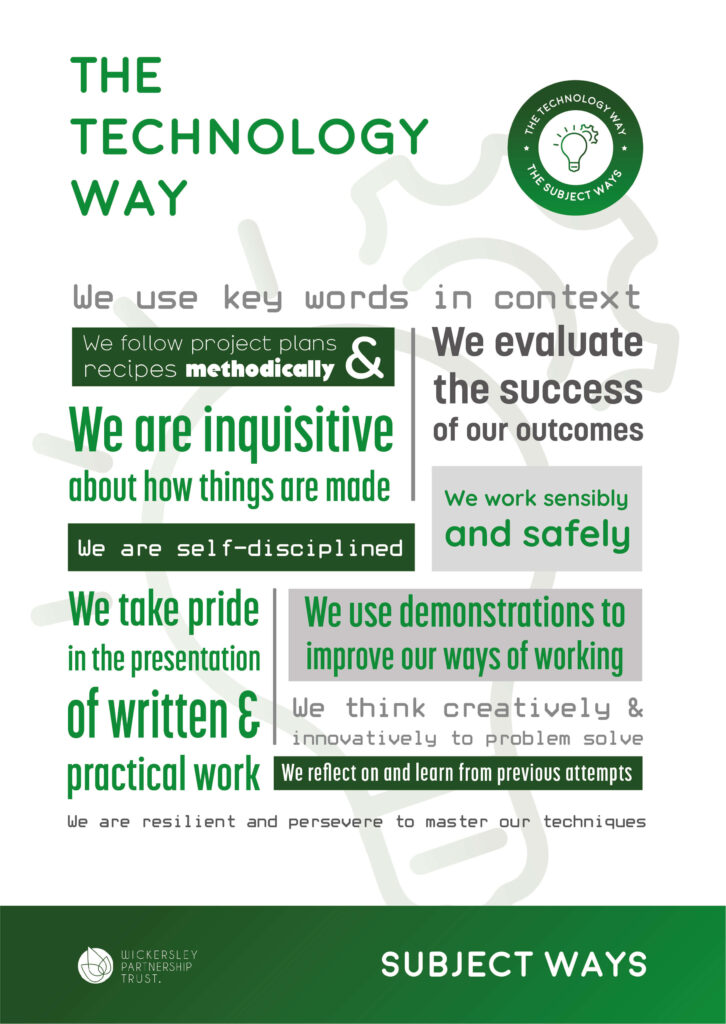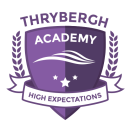Curriculum
Hospitality and Catering (Technical)
The Technology Way
Our subject has a ‘Subject Way’ at the heart of it. Our Subject Way is designed to help students become young subject specialists. The Subject Way has two main purposes:
Firstly, to teach students the vital skills they need to achieve their full potential and gain the very best grades they can. Secondly, to teach students how each subject relates to the wider world, incorporating the life skills they will learn.
It is our belief that knowing how what you learn links to the wider world, brings a subject to life and therefore improves overall understanding and engagement.

Curriculum Intent
The vision for Design and Technology across WPT is that every student regardless of background or context receives a high quality and engaging education that becomes a valued part of their daily lives and if they wish allows them to pursue the subject further into higher education or employment
The Design and Technology curriculum aims to develop students’ skills, knowledge, values and passion for Design and Technology, to allow them to be successful in an ever-changing world. Students will develop their problem solving, organisation, planning, creativity and analysis skills through a carefully developed curriculum. This provides opportunities for students to gain understanding of a range of materials, ingredients and the impact these have on themselves and the world around them. Strong values of high expectations, pride in their work, confidence, strong work ethic and a growth mindset are instilled in students throughout their education in Design and Technology at WPT. A deep passion for the subject is developed, through highly engaging and relevant curriculum content, with an emphasis of involving industry in the classroom through an extensive network of links with third parties.
In order to allow students to reach their potential and fulfil their personal aspirations they are given a wide range of subjects to continue their study at KS4.
INTENTION 1 – The removal of barriers to learning
Four common barriers, if left unchallenged, will limit the progress, engagement and development of students who access our curriculum. They are:
- Literacy
- Numeracy
- Oracy
- Vocabulary
Within the Technology curriculum students develop their literacy across all key stages using the reciprocal reading strategy. Each scheme of work has subject specific bodies of text, that are read as a class, using a range of reciprocal reading techniques, to develop students’ literacy skills.
The Technology curriculum places a strong emphasis on the acquisition and application of numeracy skills. In its most basic form in the early key stages this is applied through the activity of accurate measuring and understanding of various units of measurement. In later key stages this progresses to more complex mathematical operations such as applying volume equations and manipulating percentages to solve problems involving the quantities of materials and costing.
The Technology curriculum provides numerous opportunities to develop a student’s oracy skills. This is predominantly done through high quality teaching where teachers hold high expectations regarding the rigour of dialog expected from the students they teach. This is seen when communicating design ideas in class, with their teachers and their peers, and when answering questions verbally in lessons.
The teachers of the Technology curriculum expect students to have a secure and confident grasp of subject specific, tier three. At the beginning of each scheme of work students are given a list of ten, tier three, keywords that they are expected to understand and use with competency and confidence by the end of the scheme of work. Explicit vocabulary teaching strategies are implemented to develop students’ competency in using vocabulary.
INTENTION 2 – Developing skills for learning
Developing student knowledge and essential learning skills go hand in hand. Students need to remember with fluency in order to be fully established mini-subject specialists. We strive, at all times, for personal excellence by developing the six key skills for success:
- Recall
- Interpretation
- Creativity
- Analysis
- Evaluation
- Divergent thinking
The Technology curriculum embodies all of the above key skills throughout all key stages. Recall activities are embedded within all lessons as starter, AfL or plenary activities. Interpretation of key concepts such as sustainability and material properties are used when justifying their design choices. Creativity and divergent thinking skills are developed through the many opportunities students have to respond to design challenges, contexts and briefs. Students undertake in-depth, relevant analysis of research to inform their design decisions and use evaluation, as a part of the iterative design process, of continually improving on previous design ideas.
INTENTION 3 – Fostering personal attributes
The Technology curriculum aims to foster the following personal attributes of students; high expectations, pride in their work, confidence, a strong work ethic, an enquiring mind and a
growth mindset. An outline of how the curriculum achieves this is below.
- High expectations- students work to fine tolerance and aim for a high quality of finish when manufacturing.
- Pride in their work and confidence – through peer and self assessment activities students
build themselves and their peers by communicating positive aspects of their work and that of their peers. - Growth mindset – the curriculum is carefully designed to allow students the opportunity to revisit and master skills they may have previously found difficult or unattainable. Changing a student’s self perception from “I can’t,” to “I can’t, yet!”
- Enquiring mind – the curriculum’s strong emphasis on the acquisition of a broad range of skills and knowledge encourages students to ask the question ‘how?’ In a range of contexts. How can I solve this problem? How does that process work? How will this design impact society?
INTENTION 4 – Enriching student experiences and broadening their horizons
Technology, as a subject area, holds very strong links with employment, FE and HE offering students a range of pathways, post secondary education. The Technology curriculum is forward thinking in creating opportunities to enrich students’ experiences, always looking for opportunities to work with external parties from a range of backgrounds from industry partners, local employers, FE and HE, to be involved in enriching the Technology curriculum.
Curriculum
During Year 11, students will have a choice of a range of starters, mains and desserts. They will then experiment and modify these dishes to different customer demands.
In classroom based lessons they will spend time researching and modifying their dishes. Students will have 2 lessons modifying and planning their dishes and one lesson making them. This will repeat throughout each half term with students making various versions of the same dishes and refining their confidence and competence in making and presenting them.
| Y10 | HT1 | HT2 | HT3 | HT4 | HT5 | HT6 |
| Kitchen | 2.3 Food Preperation | 2.3 Food Preperation | 2.3 Food Preperation | 2.3 Food Preperation | 2.3 Food Preperation | 2.3 Food Preperation |
| Theory | 1.1 Hotpitality and catering provision | 1.1 Hotpitality and catering provision | 1.1 Hotpitality and catering provision | 1.4 Ill Health | 1.2 H+C Providers operations | 1.3 Health and Safety |
| Y11 | HT1 | HT2 | HT3 | HT4 | HT5 | HT6 |
| Kitchen | Chosen Starter experimentations, modifiction and refinement. | Chosen mains experimentations, modifiction and refinement. | Chosen dessert experimentations, modifiction and refinement. | Mock Unit 2 | Real Units 2 | |
| Theory | Unit 2 Task 2- Repond to breif | Unit 2 Task 2- Repond to breif | Unit 2 Task 2- Repond to breif | Mock Unit 2 | Revise for unit 1 exam |
Find out more
If you would like more information about our curriculum, please contact the school using the details on our contact page.
Our Subjects at KS4
CORE SUBJECTS
EBACC SUBJECTS
OPTION SUBJECTS


